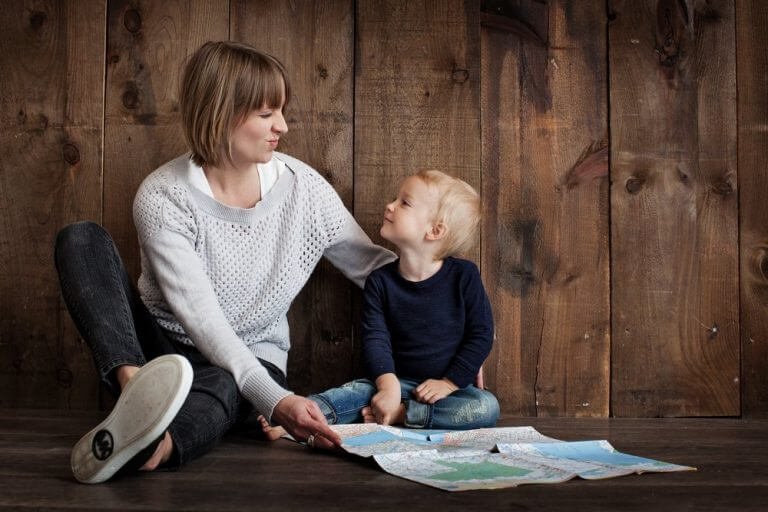Get on the floor!
Between all the technological advances over the past 10 years, it has never been easier to keep a kid occupied (side note: I did not say it is easy, just easier!). There are smartphones, and tablets, and Netflix, and Amazon Instant Video, and an infinite number of fancy new toys that are tailored to entertain our children. Can anyone honestly say they haven’t plopped their child down in front of the TV in order to get some adulting done? Didn’t think so. The problem is that we adults have so much on our plates that we feel as if we have to rely on these babysitting tools to just keep our own heads above water. Sadly, our lives have become so busy that it actually seems like a chore to spend quality time with our children! I find myself needing to take a step back every so often to remember just why it is so important that we carve out time to actually sit ON THE FLOOR and play with our two little girls.
Relationship
Probably the most important and yet little discussed aspect of child rearing is simply that time together playing builds a relationship between us and our children. Kids are often either unable or unwilling to just tell us about their day. While your spouse might use words to tell you about the funny thing that happened at work, our kids use play to express what’s going on in their lives. If you really pay attention, you’ll be amazed at what you learn from being actively involved in your kids’ play session. And while they won’t tell you, “daddy, thank you for playing with me,” trust me when I say they notice and appreciate that time spent together. Time on the floor with your child lets them know that they are important to you, and that you are willing to meet them at their level. Think that feeling might pay off when they are older and have something serious to discuss? You bet it will! My daughter, Mary, is nothing if not persistent with her, “Daddy, come here!” requests. There are many times when I would like to ignore them in favor of work or relaxing on the couch, and plenty of times I do find ways to occupy her while continuing what I’m doing. However, I try to make a point of at least once a day not brushing her off, but letting her lead me into her world. Whether it’s making pretend cupcakes, putting her into princess dresses, or having a dance party, I find the time together is always rewarding. Just the other day I took Mary to the park for the first time in a while and discovered she is now able to climb the rock wall. She loved showing off all the new skills she’s developed (little monkey), and I loved seeing them.
Learning
This is one area where our public school system doesn’t do as well of a job as it could. Young children are not built to sit in a chair for hours listening to someone lecture them on whatever topic they are learning that day. Children learn by doing, by playing, by experimenting, by getting their hands dirty (and boy do they manage to get dirty). If you have ambitions for your child to excel academically, playing with them at an early age provides ample opportunity to teach in a way they can understand. Every play session doesn’t need to have a specific learning goal, but chances will constantly arise to teach colors, letters, spelling, increase vocabulary, as well as develop an understanding of concepts like sharing, morals, religious beliefs, handling frustration effectively etc. Learning does not have to be boring, and in fact, being actively engaged in a play activity makes children more receptive to your lessons! Children are little sponges that soak up far more than we adults know. We usually take notice when they start repeating phrases we say without thinking, “oh my goodness!,” for our daughter… it may be cursing in some families (whoops). An example of finding a learning opportunity is on one of our family walks, we taught Mary that the scientific name for thunderhead clouds is “cumulonimbus.” That’s right, we are turning our 2 year old into a nerd already, but it is adorable to hear her say it! The point being that childhood is intended for learning how to be a human, and so it makes sense to take advantage and teach the lessons WE want them to learn through play, rather than leave it up to TV/society/friends to teach things we may not agree with.
BUILDS PROBLEM SOLVING SKILLS
This goes hand in hand with the learning aspect mentioned above, so I just want to go into it briefly. Kids often get frustrated when they aren’t able to do something easily on their own. Many parents don’t truly recognize this until school begins assigning homework and their kids begin to ask mom and dad to do it for them. This tendency can be reduced by helping our kids learn problem solving skills earlier on. We do this by helping them to figure out how to accomplish challenging tasks on their own, rather than simply doing it for them ourselves. This requires patience on the part of the parent because it is easy to end a tantrum by just doing it for our child. The short-term struggle for the parent will pay off long-term by helping your son or daughter learn the process of problem solving, as well as the importance of hard work. At this moment, we are trying to teach Mary how to put her own clothes on. It is so hard to watch her struggle to get the shirt over her head, and to find the holes for her arms. Every single time I am tempted to jump in and make it easier for her (and me!), and I have to remind myself of the lesson she is learning that her struggles pay off, because she is always able to do it eventually! The smile on her face when she finally succeeds is priceless.
REDUCES BEHAVIOR PROBLEMS
This one gets into my work with children and their parents. Most parents bring their child to see me because of significant behavior problems that no amount of time outs or corporal punishment has seemed to address. If for no other reason, giving your children ample focused play time at an early age has been shown to reduce the development of these types of behavior problems! When kids feel important and valued, they want to keep that status and avoid disappointing their parents. When kids don’t feel important, they are more likely to act out, connect with undesirable peers, and cause many headaches for their parents. Kids enjoy attention, and acting out usually gets their parents’ attention. A hard truth is that negative attention is still attention. It takes as little as 15 minutes of attentive play each day to help build the positive relationships that can avoid these outcomes. My wife and I have both noticed a difference in how Mary treats her sister depending on whether or not we’ve had the chance to play with her. She is more rough when we’ve plopped her in front of the TV too much, or asked her to play by herself for too long. We are quickly learning the signs that we better play horses or build a castle to avoid a tantrum or aggressive behavior towards her sister.
Make your life a little easier
And of course the unspoken thing here is that parents can end up struggling with anxiety or depression because of the challenges posed by their children. When thinking about this, you may be feeling overwhelmed with trying to cram another thing into your schedule, and “forced fun” may not seem like what you’d like to be doing with that spare time. Though I hope this blog shows a few of the numerous reasons that it is worthwhile to take time out of your day and to get on the floor with your kids! It’s never too late to start this process, whether your child is 3 or 10, or whether they are acting out or not. Try and schedule yourself that time (and I literally mean put this on your calendar to begin with) starting today! Maybe you’ll come to enjoy that time as well. I have plans for future posts that will go into detail on how to play with your kids, because not all of us had the best role models when going through our own childhood. Believe me, it is something you can learn to do... and your kids will LOVE you for it!If you'd like to discuss how you can improve your relationship or help address your child's behavior issues, schedule a free 30 minute consultation today!



